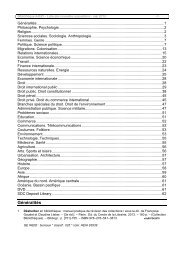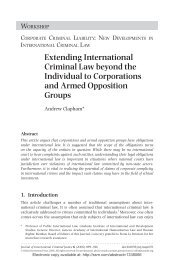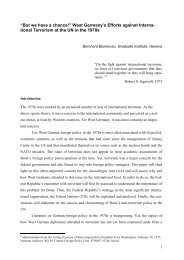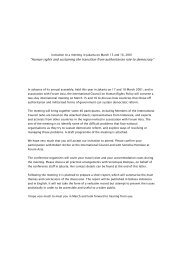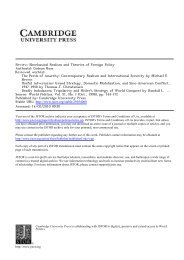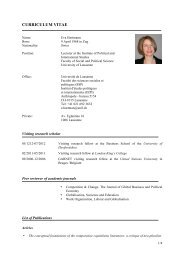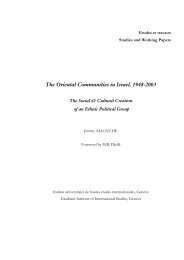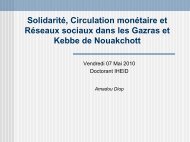Syllabus - The Graduate Institute, Geneva
Syllabus - The Graduate Institute, Geneva
Syllabus - The Graduate Institute, Geneva
Create successful ePaper yourself
Turn your PDF publications into a flip-book with our unique Google optimized e-Paper software.
Master in International Affairs (MIA)<br />
Academic year 2010 - 2011<br />
Political Economy of the Crisis<br />
IA020 – Spring<br />
6 ECTS<br />
Tuesdays 16:15-18:00 (Rigot 3)<br />
Course Description<br />
<strong>The</strong> forces of globalization – trade and financial liberalization,<br />
political integration and technological change – have led to a<br />
dramatic expansion of the global financial system during the<br />
last two decades. Yet, the crisis that started in August 2007<br />
has brutally reminded us that global economic integration<br />
remains a fragile enterprise as governments can quickly revert<br />
to nationalistic policies under the double pressure of powerful<br />
lobbies and of vocal unions. This class focuses on economic,<br />
political and social forces that have impacted on the unfolding<br />
of the crisis and their long-term consequences on regulation,<br />
the role of states, and inequality.<br />
PROFESSORS<br />
Cédric Dupont<br />
cedric.dupont@graduateinstitut<br />
e.ch<br />
+41 22 908 59 50<br />
Office hours:<br />
Mondays 14h30-16h00<br />
(Rigot 34)<br />
Charles Wyplosz<br />
Charles.wyplosz@graduateinsti<br />
tute.ch<br />
+41 22 908 59<br />
Office hours:<br />
Thursdays 10-12<br />
(Rigot 33)<br />
ASSISTANT<br />
Nell Williams<br />
Nell.williams@graduateinstitute.<br />
ch<br />
+41 22 908 59 51<br />
Office hours:<br />
Tuesdays 13:30-15:30<br />
(Rigot 38)<br />
<strong>Syllabus</strong><br />
Course Website<br />
http://graduateinstitute.ch/political-science/courses/spr-11/political-economy-of-crisis-2011.html<br />
Requirements<br />
Students will be evaluated on the following requirements, each with equal weight in the final grade:<br />
1. One class presentation 15’ maxi, group of two,<br />
2. Final exam (take-home with essay questions) distributed after the last class session and due<br />
within 72 hours;<br />
3. Class participation<br />
Readings<br />
Required<br />
In order to be able to participate in class discussions and to prepare for the exam, students must do a<br />
set of core readings indicated in the course outline below. Given that most core readings are easily<br />
accessible online (for <strong>The</strong> Economist, use EBSCOhome Business via the <strong>Institute</strong>’s library), there is<br />
no reading packet for this course. Chapters from books will be put online (password protected).<br />
INSTITUT DE HAUTES ÉTUDES INTERNATIONALES ET DU DÉVELOPPEMENT<br />
GRADUATE INSTITUTE OF INTERNATIONAL AND DEVELOPMENT STUDIES<br />
SWITZERLAND - TEL +41 (0)22 908 57 00 - http://graduateinstitute.ch
Background and preparation<br />
<strong>The</strong> emphasis of the course is not upon the technical aspects of the operation of financial markets,<br />
but rather upon the evolving political and institutional context in which they operate.<br />
To get an overall picture of the “saga” of the panic between September 2007 and Spring 2009, we<br />
recommend two books:<br />
Wessel, David (2009/10) In Fed We Trust. Ben Bernanke’s War on the Great Panic. New<br />
York: Three Rivers Press [a focus on the role of the Fed and its Chairman]<br />
Sorkin, Andrew Ross (2009/10). Too Big to Fail: Inside the Battle to Save Wall Street. New<br />
York: Penguin. [a thorough chronicle with a focus on the big banks and the Treasury;<br />
reads like a thriller]<br />
For those who may want to refresh their basic understanding of international macroeconomic as well<br />
as get a broader view of the political economy of monetary policy (and its international dimensions)<br />
we list below a few fundamental books as well as a list of useful websites:<br />
Economics – References:<br />
Burda, M. and Wyplosz, C., Macroeconomics, A European Text (Fifth edition).<br />
Krugman, P. and Obstfeld, M. International Economics: <strong>The</strong>ory and Policy (latest edition). especially<br />
parts III and IV.<br />
Economics and International Political Economy – General (selected) Bibliography:<br />
Dicken, Peter 2007. Global Shift: Reshaping the Global Economic Map in the 21 st Century.<br />
London: Sage.<br />
Eichengreen, Barry (1996). Globalizing Capital. Princeton: Princeton University Press.<br />
Eichengreen, Barry (2002). Financial Crises. Oxford: Oxford University Press.<br />
Helleiner, Eric (1994). States and the Reemergence of Global Finance: From Bretton Woods to the<br />
1990s. Ithaca: Cornell University Press.<br />
Ravenhill, John, ed., (2011). Global Political Economy. Oxford: Oxford University Press (3 nd<br />
edition).<br />
Reinhardt, Carmen and Kenneth Rogoff (2009). This Time is Different. Eight Centuries of Financial<br />
Folly. Princeton: Princeton University Press.<br />
Journals:<br />
International Organization; World Politics; <strong>The</strong> World Economy; International Studies Quarterly;<br />
American Political Science Review; Review of International Political Economy (RIPE); Journal of<br />
Economic Perspectives; World Development; Journal of Common Market Studies. Economic Policy;<br />
Foreign Affairs<br />
Newpapers, Magazines:<br />
<strong>The</strong> Economist and Financial Times<br />
For an account of various key moments and some interesting analyses, see the following editions of<br />
<strong>The</strong> Economist:<br />
- Page 2 -
International Organizations:<br />
Students should carefully explore the International Monetary Fund's website<br />
http://www.imf.org/external/index.htm which covers a wide range of information and publications. For<br />
most countries, the IMF now publishes its annual economic reviews or abstracts thereof (Article 4<br />
reviews). With regard to the Asian crisis, the IMF’s May 1998 International Capital Markets reports is<br />
particularly useful.<br />
OECD: for one of the most useful global economic data references, see the OECD's World Economic<br />
Outlook. http://www.oecd.org/<br />
Bank of International Settlements: BIS Annual Report, http://www.bis.org/<br />
National Central Banks:<br />
All national central banks maintain rich websites. In particular, you should look at major monetary<br />
policy speeches by prominent central bankers as well as the most important regular economic<br />
publications of leading central bank (Federal Reserve Bank, European Central Bank, Bank of Japan,<br />
Bank of England, German Bundesbank, Swiss National Bank etc.)<br />
Course content<br />
This class will be co-taught by the two Professors who will always be present together in the room.<br />
Each session will begin by a students’ presentation (no longer than 15 min), followed by a<br />
presentation by one of the two Professors (CD or CW) (no longer than 30 min) and then a general<br />
discussion.<br />
In most sections, the readings are separated in two parts: 1) core readings: those upon which the<br />
presentations could be based and that all students are expected to read before class for discussions;<br />
2) supplements: which may be of use to presenters and that are available for interested students.<br />
When no distinction is mentioned, all readings are core.<br />
I. INTRODUCTORY CLASS: WHAT HAPPENED? [22 February] [CD and CW]<br />
Readings:<br />
Reinhardt, Carmen and Kenneth Rogoff (2009). This Time is Different. Eight Centuries of Financial<br />
Folly. Princeton: Princeton University Press (chap. 1) and pp. 260-273;<br />
Ravenhill, John (2011). “Prologue” in Ravenhill, John, ed., (2011). Global Political Economy. Oxford:<br />
Oxford University Press (3 nd edition).<br />
Wessel, David (2009/10) In Fed We Trust. Ben Bernanke’s War on the Great Panic. New York: Three<br />
Rivers Press; chap. 1<br />
Discussion Questions:<br />
1. <strong>The</strong> crisis initially looked manageable, and then became uncontrollable in many<br />
dimensions. Which ones?<br />
2. Where were key faulty decisions by political authorities?<br />
3. Did the authorities manage the crisis better than in 1929?<br />
- Page 3 -
II.<br />
WHAT WENT WRONG IN THE US MORTGAGE MARKET [29 February] [CW]<br />
Readings (core):<br />
IMF, World Economic Outlook, July 2009, Chapter 1.<br />
Will the Walls Come Falling Down.? <strong>The</strong> Economist, April 20, 2005.<br />
After the Fall, <strong>The</strong> Economist, June 16, 2005.<br />
When it goes Wrong, <strong>The</strong> Economist Sept. 22, 2007<br />
What went wrong (special briefing on Wall Street’s crisis), <strong>The</strong> Economist, March 22, 2008<br />
Readings (supplements):<br />
Brunnermeier, Markus K. 2009. "Deciphering the Liquidity and Credit Crunch 2007-2008." Journal of<br />
Economic Perspectives 23(1): 77-100.<br />
Krishnamurthy, Arvind 2010. "How Debt Markets Have Malfunctioned in the Crisis." Journal of<br />
Economic Perspectives 24(1): 3-28.<br />
Discussion Questions:<br />
1. Who should/could have prevented the housing market price bubble?<br />
2. Are subprime mortgages necessarily a bad idea?<br />
3. Did other countries experience similar problems? Why?<br />
III.<br />
FINANCIAL LIBERALIZATION IN THE US SINCE REAGAN [8 March] [CD]<br />
Readings (core):<br />
Provost, Colin (2010). Another Race to the Bottom? Venue Shopping for Regulators in the American<br />
Financial System. ECPR Dublin on Regulation.<br />
Rosenbluth, Frances and Ross Schaap (2003). <strong>The</strong> Domestic Politics of Banking Regulation,<br />
International Organization 57 (2):<br />
Panitch, Leo and Martijn Konings (2009). Myths of Neoliberal Deregulation. New Left Review 57: 67-<br />
83.<br />
Suarez, Sandra and Robin Kolodny (2010). Paving the Road to “Too Big to Fail”: Business Interests<br />
and the Politics of Financial Deregulation in the U.S. Philadelphia: Temple University.<br />
Readings (supplements):<br />
Peretz, Paul and Jean Reith Schroedel (2009). Financial Regulation in the United States : Lessons<br />
from History. Public Administration Review July/August : 603-612.<br />
Ferguson, Thomas and Robert Johnson (2009). Too Big to Bail. Part I : From Shadow Financial<br />
System to Shadow Bailout. International Journal of Political Economy 38(1) [read pp. 11-21]<br />
- Page 4 -
Discussion Questions:<br />
1. Was there an excessive “deregulation” of finance in the US that conducted to the crisis?<br />
2. Who are the big players in the regulatory dynamics in finance?<br />
3. Was there anything new (or specific to the US) in the US financial regulation in the late 20 th<br />
century and early 21 st century?<br />
IV.<br />
THE TRANSMISSION OF THE CRISIS TO EUROPE [15 March] [CW]<br />
Readings (core):<br />
European Commission (2010) “<strong>The</strong> EU's response to support the real economy during the economic<br />
crisis: An overview of Member States' recovery measures”, European Economy Occasional Paper No.<br />
51, p. 10-30.<br />
European Commission (2009) Quarterly Report of the Euro Area 8(2), p. 5-13.<br />
Readings (supplements):<br />
International Monetary Fund (2009) World Economic Outlook, October. [Select parts concerning<br />
Europe.]<br />
International Monetary Fund (2009) World Economic Outlook, October. [Select parts concerning<br />
Europe.]<br />
Hardie, Iain and David Howarth (2009). Die Krise but La Crise? <strong>The</strong> Financial crisis and the<br />
transformation of German and Banking Systems. Journal of Common Market Studies 47(5):1017-<br />
1039.<br />
Discussion Questions:<br />
1. <strong>The</strong> first signal of the upcoming crisis was given by BNP-Paribas. Why ever?<br />
2. Why did Europe get hit at all?<br />
3. Europe seems to have suffered as much as the US. Is this a paradox?<br />
V<br />
THE GLOBAL LIBERALIZATION WAVE [22 March] [CD]<br />
Readings (core):<br />
Wyplosz, Charles (2002) “How Risky is Financial Liberalization in the Developing Countries?”<br />
Comparative Economic Studies, June.<br />
Kaminsky, Graciela and Sergio L. Schmukler (2007) “Short-Run Pain, Long-Run Gain: Financial<br />
Liberalization and Stock Markets Cycles”, George Washington University.<br />
Deeg, Richard and Mary O'Sullivan 2009. "<strong>The</strong> Political Economy of Global Finance Capital." World<br />
Politics 61(4): 731-763.<br />
- Page 5 -
Readings (supplements):<br />
Williamson, Jeffrey G. 2007. "Global Capital Markets in the Long Run." Journal of Economic Literature<br />
XLV(June): 400-409.<br />
Reinhardt, Carmen and Kenneth Rogoff (2009). This Time is Different. Eight Centuries of Financial<br />
Folly. Princeton: Princeton University Press<br />
Discussion Questions:<br />
1. How has the world become financially global?<br />
2. How have countries and markets dealt with risk in such a world?<br />
3. Are all crises potentially global?<br />
VI.<br />
THE TRANSMISSION OF THE CRISIS TO EMERGING MARKET COUNTRIES [29 March]<br />
[CW]<br />
Readings (core):<br />
International Monetary Fund (2009) World Economic Outlook, Chapter 4.<br />
Reinhardt, Carmen and Kenneth Rogoff (2009). This Time is Different. Eight Centuries of Financial<br />
Folly. Princeton: Princeton University Press, chap. 15.<br />
Domino <strong>The</strong>ory, <strong>The</strong> Economist, Feb. 28, 2009<br />
Readings (supplements):<br />
1) International Monetary Fund (2010) World Economic Outlook, April. [Select parts concerning<br />
emerging market economies.]<br />
2) Berkmen, Pelin, Gaston Gelos, Robert Rennhack, and James P. Walsh (2009 ”<strong>The</strong> Global<br />
Financial Crisis: Explaining Cross-Country Differences in the Output Impact”, IMF Working Paper<br />
WP 09/280. [Technical but just read the results.]<br />
Discussion Questions:<br />
1. How was the crisis transmitted to emerging market economies?<br />
2. Why did the emerging market economies recover so fast?<br />
3. Is the dual-track recovery a symbol of the new world economy?<br />
VII.<br />
MACROECONOMIC POLICY RESPONSES [5 April] [CW]<br />
Readings (core):<br />
IMF (2009) Global economy beyond the crisis, Staff Note to the G20.<br />
Romer, Christina (2009) “<strong>The</strong> lessons of 1937”. <strong>The</strong> Economist, June 18.<br />
- Page 6 -
European Commission (2009) “<strong>The</strong> EU’s responses to support the real economy during the economic<br />
crisis”, European Economy Occasional Papers 511.<br />
Akerlof, George A. and Robert J. Shiller (2009). Animal Spirits. How Human Psychology Drives the<br />
Economy, and Why it Matters for Global Capitalism. Princeton: Princeton University Press. Chap. 7<br />
(Why Do Central Bankers Have Power over the Economy) and Postcript to Chap. 7 (<strong>The</strong> current<br />
financial Crisis: What is to be Done)<br />
Readings (supplement material)<br />
Testimony of Mervyn King, Governor the Bank of England.<br />
Blanchard, Olivier (2009) (Nearly) Nothing to Fear but Fear Itself, <strong>The</strong> Economist, January 29, 2009.<br />
<strong>The</strong> Monetary-Policy Maze, <strong>The</strong> Economist, April 25, 2009<br />
Discussion Questions:<br />
1. Why are the 2010s unlikely to be like the 1930s?<br />
2. What did governments do?<br />
3. What did central banks do?<br />
VIII.<br />
SAVING BIG BANKS [12 April] [CD]<br />
Readings (core):<br />
IMF (2009) “Global economic policies and prospects”, Staff notes to the G20, p.11-14.<br />
Ferguson, Thomas and Robert Johnson (2009). Too Big to Bail. Part II : Fatal Reversal – Single<br />
Payer and Back. International Journal of Political Economy 38(2) : 5-45<br />
Wessel, David (2009/10). In Fed We Trust. Chap 10 (Fannie, Freddie and Feddie), Chap. 11<br />
(Breaking the Glass) and 12 (Socialism with American Characteristics).<br />
Wyplosz, Charles (2008) “Public interventions in presence of acute financial distress”, Briefing Note to<br />
the Committee for Economic and Financial Affairs of the European Parliament.<br />
End of Illusions, <strong>The</strong> Economist, July 19, 2008<br />
Kenneth Rogoff (2008), “<strong>The</strong> world cannot grow its way out of this slowdown”, <strong>The</strong> Economist, July<br />
29, 2008.<br />
“Hall of shame”, <strong>The</strong> Economist, August 7, 2008.<br />
Wall Street’s Bad Dream (special report), <strong>The</strong> Economist, Sept. 20, 2008<br />
I Want Your Money, <strong>The</strong> Economist, Sept. 20, 2008<br />
<strong>The</strong> Bailiff, <strong>The</strong> Economist, Oct. 11, 2008<br />
Big Government Fights Back, Jan. 31, 2009<br />
- Page 7 -
Dashed expectations, <strong>The</strong> Economist, Feb. 14, 2009<br />
<strong>The</strong> Curse of Politics, <strong>The</strong> Economist, April 16, 2009.<br />
Readings (supplements):<br />
IMF (2009) Global Financial Stability Report, October, Ch. 3.<br />
European Commission (2009) Quarterly Report on the Euro Area 8(2), p.14-20.<br />
Sorkin, Andrew Ross (2009/10). Too Big to Fail: Inside the Battle to Save Wall Street. Chap. 14 &15<br />
(on Lehman) and 19&20 (on TARP and capital injection in big banks).<br />
Bulow, Jeremy and Paul Klemperer (2009) “Reorganizing the banks: Focus on the liabilities, not the<br />
assets”, VoxEU.<br />
Discussion Questions:<br />
1. Should governments have saved banks? All of them?<br />
2. Do banks have an incentive to take too much risk?<br />
3. Should bankers be personally punished?<br />
IX.<br />
THE EUROPEAN DEBT CRISIS [19 April] [CW]<br />
Readings (core):<br />
De Grauwe, Paul 2010. "Crisis in the Eurozone and how to deal with it." CEPS Policy Brief 204.<br />
Wyplosz, Charles (2010) “High deficits and debts”, Briefing Note to the Committee for Economic and<br />
Financial Affairs of the European Parliament.<br />
Wyplosz, Charles (2010) “<strong>The</strong> Eurozone debt crisis: facts and myths”, VoxEU.<br />
Eichengreen, Barry (2010) “Europe’s Historic Gamble”, Project Syndicate.<br />
Tony Barber (2010) “<strong>The</strong> euro: Dinner on the edge of the abyss”, Financial Times, October 10.<br />
Readings (supplement material)<br />
Pisani-Ferry, Jean 2010. "Euro-Area Governance: What Went Wrong? How to Repair it?" Bruegel<br />
Policy Contribution 2010/05.<br />
Gros, Daniel 2010. "Adjustment Difficulties in the GIPSY Club." CEPS Working Document 326.<br />
Lannoo, Karel 2010. "Europe 2020 and the Financial System: Smalller is Beautiful." CEPS Policy<br />
Brief 211.<br />
- Page 8 -
Discussion Questions:<br />
1. Why did the crisis hit (so far) only Euro Area countries?<br />
2. What were the alternatives open to the authorities?<br />
3. Are the bailouts of Greece and Ireland a sign of enhanced solidarity?<br />
X. GREECE AND AUSTERITY [3 May] [CD]<br />
Readings (core):<br />
European Commission (2010) “<strong>The</strong> economic adjustment programme for Greece”, European<br />
Economy Occasional Papers No. 61.<br />
IMF, “Greece: Second Review”, December 2010.<br />
Krugman, Paul (2010) “Greek endgame” New York Times, May 5, 2010.<br />
“Papandreaou tries to prop up the pillars”, <strong>The</strong> Economist, December 17, 2009.<br />
“<strong>The</strong> end of the party”, <strong>The</strong> Economist, May 5, 2010.<br />
“Repayment days”, <strong>The</strong> Economist, February 3, 2011.<br />
Thomas, Landon Jr. (2011) What’s broken in Greece? Ask an entrepreneur”, New York Times,<br />
January 29, 2011.<br />
Readings (supplement material):<br />
IMF, “Stand-by agreement”, May 2010.<br />
European Commission (2011). “<strong>The</strong> Economic adjustment programme for Ireland”, European<br />
Economy Occasional Papers No. 76 (parts V.3 and V.4)<br />
Burgoon, Brian (2009). "Globalization and backlash: Polayni's revenge?" Review of International<br />
Political Economy 16(2): 145-177<br />
Discussion Questions:<br />
1. Has Greece a chance of delivering on its promises?<br />
2. Is the austerity package socially fair?<br />
3. Is Greek sovereignty trampled upon?<br />
- Page 9 -
XI.<br />
ECONOMICS OF FINANCIAL MARKET REGULATION [10 May] [CW]<br />
Readings (core):<br />
Basel Committee on Banking Supervision, “Group of Governors and Heads of Supervision announces<br />
higher minimum capital standards”, Press release, September 2010.<br />
<strong>The</strong> Economist, “Taming the banks” and “Basel’s buttress”, September 16, 2010.<br />
<strong>The</strong> Economist, “<strong>The</strong> great unknown”, January 13, 2011.<br />
Acharya, Viral et al. (2010) “A critical assessment of the Dodd-Frank Wall Street reform and<br />
Consumer Protection Act”, Vox EU.<br />
Goohart, Charles and Dimitri Tsomocos (2009) “Liquidity, default, and market regulation”, VoxEU.<br />
Readings (supplements):<br />
Rajan, Raguram (2010) “A Better Way to Curb Size”, Financial Times.<br />
Walter, Andrew (2010). Global regulatory norms after the crisis: <strong>The</strong> case of China and Basel<br />
standards. ECPR annual workshop paper.<br />
Discussion Questions:<br />
1. Why banks need to be regulated?<br />
2. How to deal with banks too big to fail?<br />
3. Are markets poorly regulated and supervised?<br />
XII. POLITICS OF FINANCIAL MARKET REGULATION: DOMESTIC AND EUROPEAN<br />
DYNAMICS [17 May] [CD]<br />
Readings:<br />
Levine, Ross (2010). <strong>The</strong> governance of financial regulation: reform lessons from the recent crisis.<br />
BIS Working Paper 329.<br />
Taming Finance by Empowering Regulators. A Survey of Policies, Politics and Possibilities (2010).<br />
UNDP<br />
<strong>The</strong> Regulatory Rumble Begins, <strong>The</strong> Economist, May 30, 2009<br />
Readings (supplements):<br />
Donnelly, Shawn (2010). Surpassing Network Governance? European Financial Market Regulation<br />
after the financial crisis.<br />
Pesendorfer, Dieter (2010). Overcoming Systemic Financial Risks in Europe: Contested Policy<br />
Responses<br />
Bernauer, Thomas and Vally Koubi (2006). On the interconnectedness of regulatory policy and<br />
- Page 10 -
markets: Lessons from Banking, British Journal of Political Science, 36: 509-525.<br />
Discussion Questions:<br />
1. How can we explain domestic differences in regulatory systems?<br />
2. Who is the principal and who is the agent?<br />
3. Has anything changed in the politics of regulation after the crisis?<br />
XIII. POLITICS OF INTERNATIONAL FINANCIAL MARKET REGULATION: INTERNATIONAL<br />
COOPERATION AND DELEGATION [24 May] [CD]<br />
Readings:<br />
Helleiner, Eric (2010). What Role for the New Financial Stability Board? <strong>The</strong> Politics of International<br />
Standards after the Crisis. Global Policy 1(3): 282-290<br />
Arner, Douglas and Michael Taylor (2009). `<strong>The</strong> Global Financial Crisis and the Financial Stability<br />
Board: Hardening the Soft Law of International Financial Regulation?’ Asian <strong>Institute</strong> of International<br />
Financial Law Working Paper no. 6.<br />
Rodrik, Dani (2009). A Plan B for Global Finance, <strong>The</strong> Economist, March 14, 2009<br />
Kapstein, Ethan (2006). Architects of Stability? International Cooperation among financial supervisors.<br />
BIS Working paper 199.<br />
Readings (supplements):<br />
Levinson, Marc 2010. "Faulty Basel: Why More Diplomacy Won't Keep the Financial System Safe."<br />
Foreign Affairs 89(3).<br />
Rottier, Stéphane and Nicolas Véron (2010). "Not All Financial Regulation is Global." Bruegel Policy<br />
Brief 2010/07.<br />
White, Lawrence J. (2010). "<strong>The</strong> Credit Rating Agencies." Journal of Economic Perspectives 24(2):<br />
211-226.<br />
Hildebrand, Philipp (2009) “Necessary Changes for a Sounder Financial System”, Swiss National<br />
Bank.<br />
Pauly, Louis (2009). "<strong>The</strong> Old and the New Politics of International Financial Stability." Journal of<br />
Common Market Studies 47(5): 955-975<br />
Discussion Questions:<br />
1. What role for international agencies or bodies?<br />
2. What role for private actors, in particular the credit agencies?<br />
3. How can domestic and international regulatory dynamics complement each other?<br />
- Page 11 -
XIV.<br />
HOW THE WORLD HAS CHANGED [31 May] [CD AND CW]<br />
Readings:<br />
Eichengreen, Barry (2009) “<strong>The</strong> Last Temptation of Risk”, <strong>The</strong> National Interest, May-June, p. 1-7.<br />
Xinbo, Wu (2010). Understanding the Geopolitical Implications of the Global Financial Crisis. <strong>The</strong><br />
Washington Quarterly 33(4): 155-163.<br />
Wyplosz, Charles (2010) “<strong>The</strong> dollar is the worst international currency, except for all others”, What<br />
Matters, McKinsey & Co.<br />
Rajan, Raguram (2010) “Why Did Economists Not Foresee the Crisis?”, Project Syndicate.<br />
Ferguson, Niall (2009). <strong>The</strong> Ascent of Money. A Financial History of the World. New York: Penguin,<br />
Afterword: <strong>The</strong> Descent of Money, pp. 342-362<br />
Readings (supplements):<br />
Altman, Roger C. (2009). "Globalization in Retreat: Further Geopolitical Consequences of the<br />
Financial Crisis." Foreign Affairs 88(4): 2-8.<br />
Woods, Ngaire (2010). Global Governance after the Financial Crisis: A New Multilateralism or the<br />
Last Gasp of the Great Powers? Global Policy 1(1): 51-63.<br />
International Monetary Fund (2011) “<strong>The</strong> world still needs to fix key financial, economic problems”,<br />
IMF Survey Magazine, January 25.<br />
Overholt, William H. (2010). China in the Global Financial Crisis: Rising Influence, Rising Challenges.<br />
<strong>The</strong> Washington Quarterly 33(1): 21-34<br />
Discussion Questions:<br />
1. Is the crisis an indictment of capitalism?<br />
2. Is the crisis an indictment of globalization?<br />
3. What would you expect to be permanently changed by the crisis?<br />
- Page 12 -


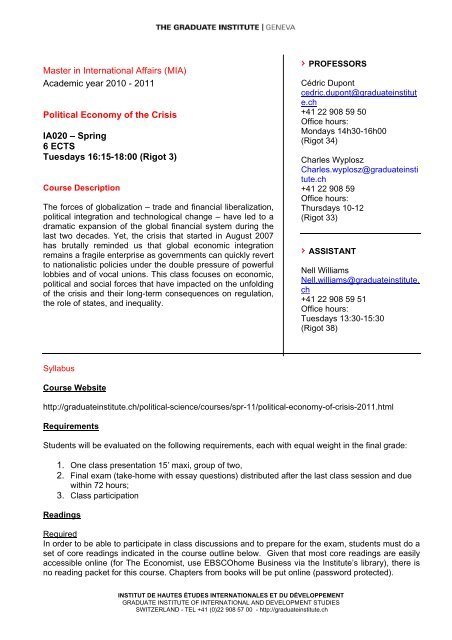
![Download [pdf] - The Graduate Institute, Geneva](https://img.yumpu.com/23370020/1/190x248/download-pdf-the-graduate-institute-geneva.jpg?quality=85)
